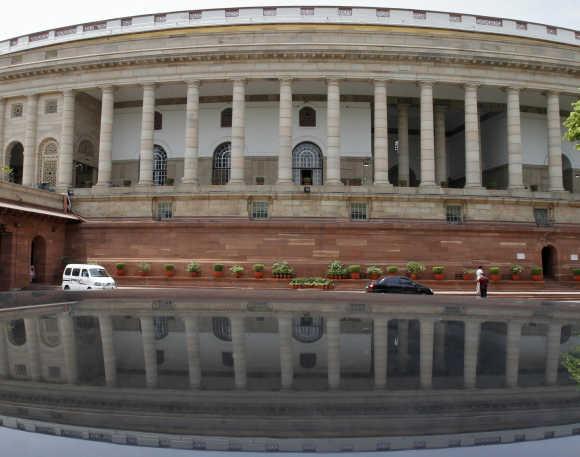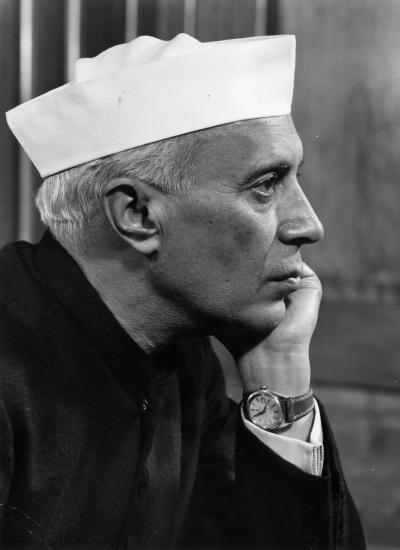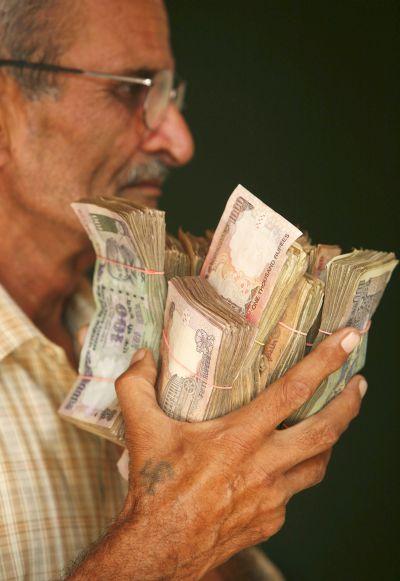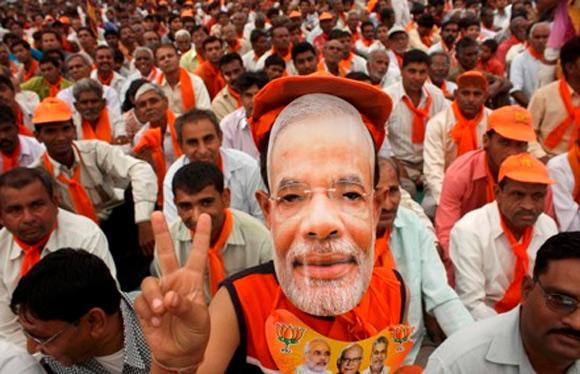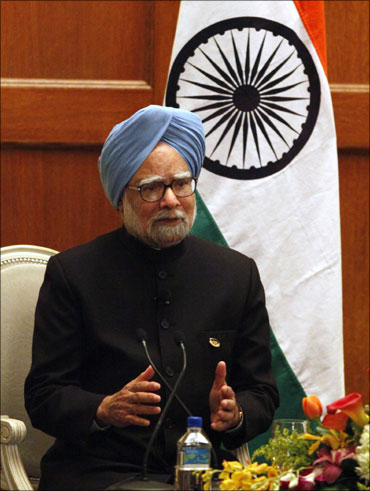 | « Back to article | Print this article |
Planning Commission: From glorious days to an untimely end
With changed financial priorities and new political imperatives, the Planning Commission has become irrelevant over the years, says Sanjeeb Mukherjee.
Yojana Bhawan, the headquarters of the Planning Commission, is an imposing six-storeyed structure in the heart of New Delhi, a short drive from South and North Blocks, the seat of ultimate executive power in the country.
Yet, the distance between the two has increased in the last few years. The divide culminated on Friday when Prime Minister Narendra Modi announced the Planning Commission would have to wind up to be replaced by a think-tank-like institution.
With it, the curtains have come down on the organisation that, for 64 years, was responsible for the country's planned development.
In recent years, far from being the cornerstone of India's economic and social policy, it had come to be seen as an obstacle to fast decision-making.
Please click NEXT to read more…
Planning Commission: From glorious days to an untimely end
Instead, it had become a hub of stress-free jobs for an army of bureaucrats. Rajiv Gandhi, the former prime minister, had called the Planning Commission "a bunch of jokers".
His son and Congress vice-president, Rahul, has said that even a villager has better knowledge than members of the Planning Commission.
Former Union minister Arun Shourie called it a "parking lot" for political cronies and unwanted bureaucrats.
It is not that the panel's demise came instantly. In fact, the downfall started in the 1990s when the government clipped the powers the Planning Commission exercised on the states. It tried to remain relevant by exercising its authority through other avenues, but could not ever reach its old glory.
Modi has been able to mothball the Planning Commission because it is not a Constitutional body, unlike the Finance Commission.
The Planning Commission was created in 1950 through a resolution of the government and was headed by the then prime minister, Jawaharlal Nehru. (The prime minister is the chairman of the Planning Commission.) Gulzarilal Nanda was its first deputy chairman.
Nehru felt the need to create an over-arching body to monitor, implement and execute development programmes because most of the newly-created states of the country had little experience in handling such work.
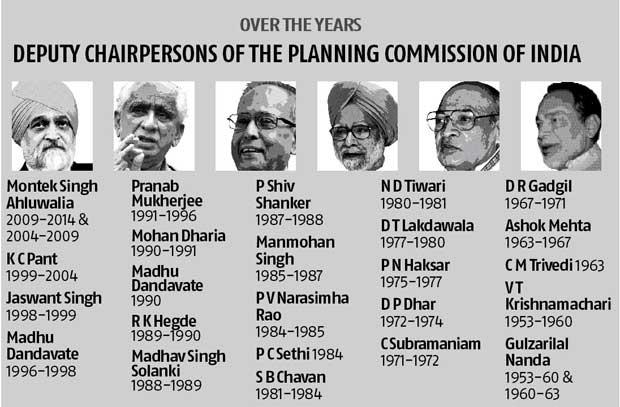 It played a vital role right up to the 1980s. One of its biggest contributions was ushering in the public-sector revolution in the country.
It played a vital role right up to the 1980s. One of its biggest contributions was ushering in the public-sector revolution in the country.
"In those days, the Planning Commission played a vital role in deciding even the location of most of the public sector units," says NC Saxena, a former secretary of the Planning Commission.
Please click NEXT to read more…
Planning Commission: From glorious days to an untimely end
It was from the 9th Five-year Plan (1997-2002) that its role started diminishing. The state governments were granted freedom to devise and execute their own schemes and were not required to seek the permission of Yojana Bhawan for every small matter.
Though the state chief ministers came to Yojana Bhawan at least once a year, these visits were largely to discuss the discretionary funds available with the Planning Commission deputy chairman. (The deputy chairman enjoys the status of a Cabinet minister, though he takes part in Cabinet meetings only as a special invitee.)
The untied funds (not linked to a scheme or programme) in the hands of the Planning Commission too gradually dwindled because they were passed on to the ministries, rendering its work merely ornamental.
"In earlier days, almost 90 per cent of untied funds granted to the state governments were routed through the Planning Commission, while just 10 per cent went through the ministries. After the 1990s, this changed and only 5 per cent of the untied funds were routed through the Planning Commission, while the remaining went through the ministries," Saxena says.
Please click NEXT to read more…
Planning Commission: From glorious days to an untimely end
Nehru’s vessel for resource allocation
Planned development stemmed from Jawaharlal Nehru’s deep belief in socialism — of the Fabian type.
Under Nehru’s influence, the All India Congress Committee resolved in May 1929 that “in order to remove the poverty and misery of the Indian people and to ameliorate the condition of the masses, it is essential to make revolutionary changes in the present economic and social structure of society and to remove gross inequalities.”
What strengthened his belief in the years that followed were the rapid strides made by the Soviet Union under the Five-year Plans, while the rest of the world — the free economies — reeled under the impact of the Great Depression. This consciousness found expression in the appointment in 1938 of the National Planning Committee by the Congress.
In 1944, the government established a Department of Planning and Development. After Independence, the issue of planning was reviewed in 1949 by the Advisory Planning Board appointed by the interim government.
In his 1950 budget speech, then finance minister John Mathai announced the setting up of the Planning Commission.
It was established in March 1950 to “promote a rapid rise in the standard of living of the people by efficient exploitation of the resources of the country, increasing production and offering opportunities to all for employment in the service of the community”.
The objective of the Commission was defined as initiating “a process of development which would raise living standards and open up for the people new opportunities for a richer and more varied life”.
Another objective of the commission was to stabilise the growth of population over a reasonable period, and to ensure that the economy became self-reliant over time.
Please click NEXT to read more…
Planning Commission: From glorious days to an untimely end
Many states, especially those ruled by the Opposition, would complain of step-motherly treatment. Shivraj Singh, the Bharatiya Janata Party chief minister of Madhya Pradesh, had recounted at an event in Bhopal some years ago how he took up farm-sector reform aggressively only after his request for assistance after a drought was snubbed by the Planning Commission.
This might have played on Modi's mind when he made the announcement during his Independence Day speech at the Red Fort.
As this role diminished, the Planning Commission re-oriented itself and started exerting greater control over the ministries, which is where differences with the ministries and their heads cropped up. The ministers thought it was unnecessary interference in their work.
In the last decade, during the rule of the United Progressive Alliance, the Planning Commission got embroiled in too many controversies like the one over poverty numbers, which had little to do with its primary objective.
"The priorities of the government too changed from supporting the public sector to playing a more inclusive role focused on rural development, education, health and so on," a senior official says. But amidst all the changes that the Planning Commission was experiencing, it left a vital process untouched: preparing the Five-year Plans.
Here too, many feel its work was not up to the mark. "The Planning Commission was undergoing some changes, but the pace was far too slow," says Arun Maira, a former member of the Planning Commission and one of the earliest proponents of transforming it.
It was only for the 12th Five-year Plan onwards (2012-13 to 2016-17) that the Planning Commission started involving experts in its work. But the idea was stoutly resisted by the people within, who felt this would encroach on their hallowed territories.
Most people believe this only weakened the intellectual bandwidth of the Planning Commission. "Two years ago, when we started formulating the 12th Five-year Plan, the targets were set keeping in mind a five-year perspective. But, the reality is the world changed in one year itself, making the entire process redundant," Maira says.
Please click NEXT to read more…
Planning Commission: From glorious days to an untimely end
He adds the idea of a five-year plan should be replaced by rolling plans or scenario planning, which he had suggested to the UPA's prime minister, Manmohan Singh, in order to convert the Planning Commission into a 'Systems Reforms Commission.'
"I am happy that Prime Minister Modi has recognised the need to completely overhaul the Planning Commission with a new name, new soul, new objective and new outlook," Maira says. According to him, the need for Planning Commission-2 had been felt for long as the current one was not equipped to handle or enforce any change.
The change, some officials say, will not just be in the nomenclature - the new body is expected to be called the National Development Reforms Commission - but will be also in its composition, functioning and outlook.
The new body, being modelled on the lines of China's reform commission, is expected to comprise three members from the corporate sector, three sitting or former chief ministers and also some cabinet ministries. The buzz is that former Union minister Suresh Prabhu may head it.
"There are think-tanks like the one talked about by Prime Minister Modi in countries like Bangladesh, Pakistan and Nepal, but none of them has worked. The fear is unless eligible people are there in the think tank, it might become just another body of experts like so many others," Saxena says.
He argues that the Planning Commission got a bad name solely because of the quality of the people it employed.
"The bureaucrats posted in the Planning Commission thought it as a parking lot, while the members sometimes were those who enjoyed clout with the ruling dispensation. If the same thing happens again under a new nomenclature, I don't think anything will change," he adds.
